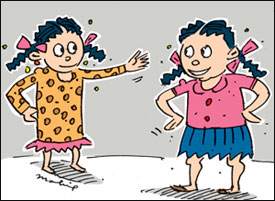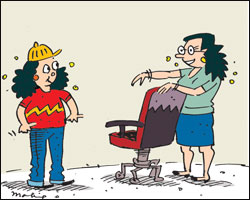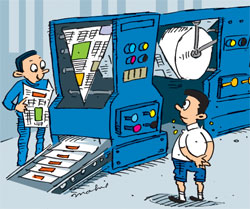|
 by
R. S. Karunaratne by
R. S. Karunaratne
The uses of
'and'
'And' is a conjunction or a connective because it joins words,
clauses and sometimes sentences.
He keeps blowing hot and cold (he keeps on changing his attitude
towards others).
We used both hot and cold water.
Neena and Meena are twins.
|

Neena and Meena are twins. |
You and I are both students.
And is used to join two ideas
The teacher was writing and reading.
The classroom was small and untidy.
Nancy is tall and beautiful.
The beggar was tired and hungry.
The compartment was big and spacious.
And is used to join two clauses
Jack fell down and Jill came rolling down the hill.
Mother washed all the clothes and father ironed them later.
Lalin was sick and went to the doctor.
And is used to join an imperative (= command) and a clause with
'will'
You say that again and I'll take you to the principal.
Take all the tablets regularly and you will feel better.
Following expressions are common in speech
Come and see me later.
I want to go and see him.
|

Come and sit by me. |
Wait and see, you'll get the job.
The girls laughed and laughed.
The chief guest's speech went on and on.
The weather was getting warmer and warmer.
Let's go and have a drink.
Go and see who is at the gate.
Come and help me with the cooking.
Come and sit by me.
Try and get the number.
Try and find my wallet.
Those days my salary was Rs. six hundred and fifty.
Following word pairs are joined by 'and'
His drawer was full of odds and ends (= small things without much
value)
The refugees were safe and sound (=unharmed)
The airline hostess was bright and breezy. (= cheerful and confident)
We are sick and tired of listening to him.
Keep your lecture short and sweet.
The foreign job aspirants were left high and dry at the airport (=
helpless)
Your English is improving by leaps and bounds. (= very quickly)
Tharindu was on the floor on his hand and knees.
After a brief interview they offered me the job then and there (also
there and then) (= immediately)
We've been looking for you here, there and everywhere (= in many
different places)
Modern English usage
* Whereabouts (written as one word)
In spoken English the word is used to ask the place or area where
someone or something is. When used as a noun it takes a singular verb.
Shane's whereabouts is unknown.
Even if you refer to several people, whereabouts takes a singular
verb.
My father had a brother and a sister but their whereabouts is
unknown.
* 'Acrylic' is a commonly misspelt word. It means the fibre used in a
kind of man-made textile. After 'l' use 'i' not 'y'.
* 'Actress', the feminine form of 'actor' is becoming less common
these days. The reason is that the word 'actress' is regarded as sexist
or belittling.
* 'AD' stands for 'Anno Domini' meaning 'in the year of our Lord.' It
indicates that the year mentioned is one occurring after the birth of
Jesus Christ. 'BC' stands for 'Before Christ'. It indicates that the
year mentioned is one occurring before the birth of Jesus Christ.
* Adapter and Adaptor
Adapter refers to a person who adapts.
Adaptor refers to a thing that adapts.
* Adjourn is a commonly misspelt word meaning 'to postpone or stop
for a short time.'
The meeting was adjourned for lunch.
* Acoustics is a tricky word that takes a singular or plural verb.
Acoustics is a subject every architect should be familiar with.
The acoustics of the auditorium are not upto the expected standard.
* Acquaint
You can acquaint someone with a fact. But this is a piece of
pretentious English. Therefore, use other verbs such as 'inform',
'tell', or 'let know'.
* Add up to should be avoided in formal writing. You can say,'amounts
to' or 'comes to' instead.
* Adequate is always followed by the preposition 'to'.
Rs. 50,000 is adequate to my need.
However, avoid using 'adequate enough' or 'more adequate'. 'More than
adequate' can be replaced with 'more than enough' or 'more than
sufficient.'
* Admission/Admittance
'Admit' means 'confess'. Admission is a confession. It also means
'allow in'. For instance, 'Admission free.'
Admittance is a formal word that means 'right to enter'. So, we see
notice boards: 'No admittance except on business.'
Starters:
Use a topic sentence in paragraphs

When you write a paragraph it usually has a topic sentence that
states the main idea. A topic sentence is very often the first sentence.
However, it can come in different places. All the other sentences tell
something about the topic sentence. Read the following passage and note
how the topic sentence is supported by other sentences.
The day Vikum visited Lake House was the turning point in his life.
Until that day, he had not been able to decide what he wanted to be when
he grew up. The minute he saw the newspaper office, all his doubts
vanished. He knew he wanted to work as a journalist. He loved to see his
name in print. What's more, he was excited to see how a newspaper was
printed by a giant machine.
Activity I
Think of a topic you would like to write about. Write a topic
sentence about your topic. Then write a few more sentences that support
the topic sentence. Your paragraph should contain at least five
sentences.
Activity 2
Choose one of the sentences given below as the topic sentence and
write a short paragraph.
I love my pet. (b) It was a very wet day. (c) A funny thing happened
to me yesterday.
Avoid common
mistakes
Beginners tend to make many common mistakes both in speech and
writing. If you are aware of then you can avoid such mistakes.
1. Between/Among
'Between is used when two
people are involved. The oranges were shared
between Anula and Mahes.
'Among' is used when more than two people are involved.
We shared the mangoes among
the five of us.
2. It's/its
Although these two words have the same pronunciation, their meanings
are different.
It's - This is the
contraction of 'it is'
It's very cold here.
It's raining.
Its - This shows
possession. The apostrophe (') is never
used to show possession here.
The dog wags its tail.
3. Farther/further
'Farther' refers to
distance.
I am tired, I can't walk farther
than this.
'Further' means 'in
addition.'
The judge ordered the police to produce further evidence.
I have nothing further to say on this matter.
4. Amount/Number
'Amount' refers to the volume of something that cannot be counted.
The elephant eats a large amount
of food.
'Number' refers to a
quantity that can be counted.
The number of elephants in
Sri Lanka has decreased. |

